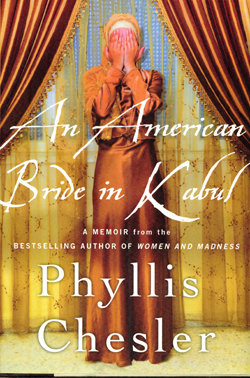Phyllis Chesler, An American Bride in Kabul, Palgrave MacMillan, © 2013, ISBN 9780230342217, 235 pages including index and bibliography, $27 cover price.
By Donald H. Harrison

 SAN DIEGO – Feminist Phyllis Chesler tells of the most formative experience in her life, when as a college student she fell in love with a charming young man from Afghanistan, married him, and moved to his native land, expecting to escape the bonds of her Orthodox Jewish home and to instead to be treated like royalty in an exotic Muslim land.
SAN DIEGO – Feminist Phyllis Chesler tells of the most formative experience in her life, when as a college student she fell in love with a charming young man from Afghanistan, married him, and moved to his native land, expecting to escape the bonds of her Orthodox Jewish home and to instead to be treated like royalty in an exotic Muslim land.
The problem was that everything changed, almost from the moment she stepped off the plane, and an Afghan official confiscated her American passport. When she arrived at the compound of her father-in-law she learned that her husband was the son of the first of three wives – and that his mother had long been out of favor with the patriarch of the family, who now was living with Wife Number Three.
Wife Number One was embittered woman and it was under her care and tutelage to which the young bride was committed. Although Chesler slept with her husband at night, during the day she was required to remain in the company of other women. She could not leave the family compound without an escort, and she was expected to cover up herself up in the style of Muslim women. If she went out on her own, she was warned, men would swarm her, thinking that she was a prostitute.
Chesler said she was required to pronounce the words that made her officially a convert to Islam, though she said she remained a Jew in her heart.
A rebellious spirit, Chesler chased under the restrictions that Afghani women accepted as their lot. She learned that her mother in law was mentally ill, and often tormented her female servants, hitting and throwing things at them. As Chesler and her mother-in-law became more alienated from each other, Chesler suspected that her mother-in-law was trying to poison her. And what of her husband? Afraid to offend his parents—lest he lose his place in the well-to-do family and be in a position to enter Afghani politics—he kept quiet, ignoring his young bride’s complaints.
Eventually, Chesler was able to talk her powerful father-in-law into letting her return to America where she ended their marriage.
However terrible her own experience was, Chesler remained enamored with Islamic lands, people and various Islamic customs – excluding those that she considered to be anti-woman, including requiring women to be veiled, requiring them to be “protected” when they go out in public, restricting during the day to the company of other women, discouraging any kind of independent thought, and, worst of all, “honor killings” when a woman is deemed to have embarrassed her family.
The memoir is less than half over when Chesler returns to the United States. Thereupon she embarks upon research about Afghanistan and nearby Islamic lands such as Pakistan and Iran, and, in line with her formal training as an academic, cites passages from numerous books as she wrestles with the question whether Islamic lands will remain forever foreign to western concepts of democracy and women’s rights, or whether there are indeed prospects for true reform.
For the most part, Chesler remains pessimistic.
*
Donald H. Harrison is editor of San Diego Jewish World, which seeks sponsorships to be placed, as this notice is, just below articles that appear on our site. To inquire, call him at (619) 265-0808 or contact him via donald.harrison@sdjewishworld.com